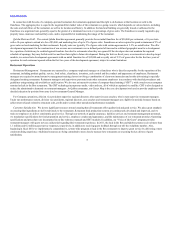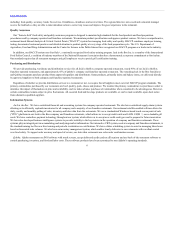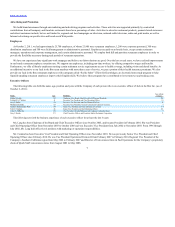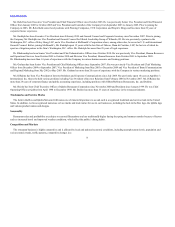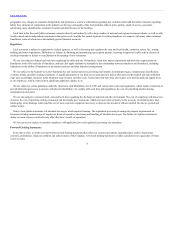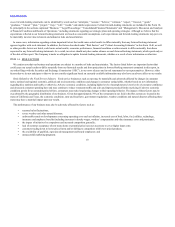Jack In The Box 2011 Annual Report Download - page 16
Download and view the complete annual report
Please find page 16 of the 2011 Jack In The Box annual report below. You can navigate through the pages in the report by either clicking on the pages listed below, or by using the keyword search tool below to find specific information within the annual report.
Table of Contents
• health, sanitation and safety standards;
• liquor licenses;
• labor and employment, including our relationships with employees and work eligibility requirements;
• the registration, offer, sale, termination and renewal of franchises;
• consumer protection and the security of information;
• Americans with Disabilities Act;
• payment card regulation and related industry rules; and
• climate change, including the potential impact of greenhouse gases, water consumption, or a tax on carbon emissions.
Risks Related to Computer Systems and Information Technology and Security . We increasingly rely on computer systems and information technology
to conduct our business. A material failure or interruption of service or a breach in security of our computer systems could cause reduced efficiency in
operations, loss of data and business interruptions and could impact delivery of food to restaurants or financial functions such as vendor payment or
employee payroll. We have insurance and business continuity plans to attempt to anticipate and mitigate such failures but it is possible that significant capital
investment could be required to rectify these problems, or more likely that cash flows could be impacted, in the shorter term. While our security architecture is
decentralized, such that payment card information is confined to the restaurant where the transaction took place, a security breach involving our point of sale
or other systems could result in loss of consumer confidence and potential costs associated with consumer fraud or privacy breach, which are subject to
increasing regulation. The costs of compliance, including increased investment in technology in order to protect consumer information, may negatively impact
our margins.
Risks Related to the Failure of Internal Controls. We maintain a documented system of internal controls, which is reviewed and monitored by an
Internal Control Committee and tested by the Company’s full-time internal audit department. The internal audit department reports to the Audit Committee of
the Board of Directors. We believe we have a well-designed system to maintain adequate internal controls on the business; however, we cannot be certain that
our controls will be adequate in the future or that adequate controls will be effective in preventing or detecting all error and all fraud. A control system, no
matter how well designed and operated, can provide only reasonable, not absolute, assurance that the control system’s objectives will be met. The design of
any system of controls is based in part on certain assumptions about the likelihood of future events, and there can be no assurance that any design will
succeed in achieving its stated goals under all potential future conditions. If our internal controls are ineffective, we may not be able to accurately report our
financial results or prevent fraud. Any failures in the effectiveness of our internal controls could have a material adverse effect on our operating results or cause
us to fail to meet reporting obligations.
Environmental and Land Risks and Regulations. We own or are a general lessor on a majority of our Jack in the Box company-owned and franchised
restaurant sites, and have engaged and may engage in real estate development projects. As is the case with any owner or operator of real property, we are subject
to a variety of federal, state and local governmental regulations relating to the use, storage, discharge, emission and disposal of hazardous materials. Failure to
comply with environmental laws could result in the imposition of severe penalties or restrictions on operations by governmental agencies or courts of law,
which could adversely affect operations. We are unaware of any significant hazards on properties we own or have owned, or operate or have operated, the
remediation of which would result in material liability for the Company. Accordingly, we do not have environmental liability insurance, nor do we maintain a
reserve to cover such events. In the event of the determination of contamination on such properties, the Company, as owner or operator, could be held liable for
severe penalties and costs of remediation.
Risks Related to Leverage. The Company has a $600 million credit facility, which is comprised of a $400 million revolving credit facility and a $200
million term loan. We may also request the issuance of up to
15


